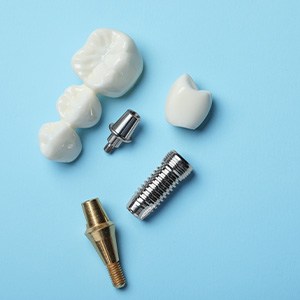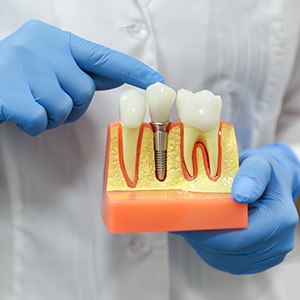
Dental Implants – Flint, MI
Next-Level Tooth Replacement
When a permanent tooth falls out, you’re losing more than just a piece of your smile. The bone that holds your teeth in place will also begin to shrink in size now that nothing is supporting it. Neighboring teeth will begin to shift towards the empty space to compensate, which can negatively affect your bite and lead to chronic teeth grinding later on. If you want to address both of these issues simultaneously, look no further; Dr. Chitra P. Naik can help you replace your teeth with dental implants in Flint, MI. Call her dental office today !
Why Choose Chitra P. Naik, DMD for Dental Implants?
- Partnered with Flint’s Best Dental Implant Specialists
- Friendly Dentist with 25+ Years of Experience
- Low-Interest Dental Financing Available
What Are Dental Implants?

Compared to traditional dentures and dental bridges, dental implants are truly next-level tooth replacement. The implant itself is a titanium post that integrates with your jawbone after it has been placed there by an oral surgeon. At that point, Dr. Naik can restore the implant with a dental crown, bridge, or denture, depending on how many teeth you’re missing. Dental implants simulate natural teeth in virtually every way, letting you eat and smile like you used to.
The 4-Step Dental Implant Process

Although the dental implant process can take several months, the long-term advantages of this solution are worth waiting for! Treatment can vary from patient to patient because their needs are different, but the overall steps are as follows: consultation, surgery, osseointegration, and restoration. If you have questions at any stage of your treatment, don’t hesitate to reach out to us for guidance. We’ll be happy to let you know what to expect and how to come out with successful implants.
Initial Dental Implant Consultation

Before starting any step of treatment, we’ll determine whether you’re eligible for dental implants and confirm whether you’ll need tooth extractions or any other preparatory procedures first. This meeting is more than just a formality—it’s a critical step toward implant success. It’s also an opportunity for you to ask questions and get a price estimate. Keep in mind that you may need to have another consultation with the oral surgeon prior to moving forward with the next step.
Dental Implant Surgery

When it’s time to have your dental implants placed, we’ll refer you to one of our trusted dental implant specialists in the area. These oral surgeons have been providing treatments for our dental office for years, and we know that once you meet them, you’ll feel confident that you’re getting the expertise you need for dental implants. An oral surgeon creates an incision in your gum tissue and inserts the implant post into your jaw. We do everything possible to make sure that all of your needs are met and that your implant placement is nothing less than safe and successful.
Dental Implant Osseointegration & Abutment

Although recovery from the implant placement surgery does not take long on the surface, the real process underneath the gums, called osseointegration, requires more time. Your jawbone grows firmly attached to the implants over the course of the next three to six months. Once this has happened, a connection piece called an abutment is inserted into the implant post.
Delivery of Dental Implant Restoration(s)

After we take impressions of your lower and upper arches, we send this information to a dental lab for them to create your restoration(s). You can expect it to take a few weeks. Finally, we can attach your custom-made crown, bridge, or denture on top of your implants. At that point, your smile is complete and ready to enjoy!
Benefits of Dental Implants

Obviously, dental implants are not your only choice for filling in the empty space in your smile. Traditional bridges and dentures are still used to replace missing teeth to this day. However, dental implants are highly recommended by many dentists thanks to the various benefits that they offer. Before you schedule a dental implant consultation, it’s a good idea to consider some of the advantages that dental implants have to offer; below are some particularly notable examples.
Day-to-Day Benefits

Dental implants make it easier to get more out of life on a daily basis thanks to these advantages:
- Simple Maintenance: Traditional dentures require special products to clean. In contrast, taking care of a prosthesis that has been permanently anchored to dental implants is not dissimilar to caring for your natural smile.
- A Dazzling Appearance: Your dental implant restoration will be customized to blend in with your natural teeth, resulting in a beautiful smile that you can be proud of.
- Being Able to Eat Most Foods: Since they’re able to join with the jawbone, dental implants have better stability than traditional bridges and dentures. This simple fact makes them capable of standing up to all kinds of foods, thus allowing you to enjoy a more varied diet.
Health Benefits

Dental implants don’t just improve your everyday life; they also have a number of advantages when it comes to health. Some of the benefits that can make dental implants an excellent choice for your smile include:
- Prevention of Bone Loss: Tooth loss and bone loss in the jaw are often closely linked. Unlike traditional dentures and bridges, dental implants can help you avoid bone loss by making sure that the jaw continues to receive the stimulation that it needs.
- Prevention of Dental Drift: It can be all too easy for your teeth to drift out of alignment when there’s empty space in your smile, but dental implants help you avoid this oral health issue by acting as a placeholder.
- Better Overall Health: Surprisingly, tooth loss may have a connection to a number of diseases. There’s reason to believe that dental implants may be able to help with some of these issues since they come closer to acting like your natural teeth than more traditional forms of tooth replacement.
Long-Term Benefits

As the years go by, it will become more and more evident just how much of a wise investment dental implants can be thanks to these benefits:
- A High Rate of Success: It is very rare for dental implants to fail. Most patients find that their new teeth remain successful after 10 or even 20 years.
- Long-Lasting Results: If you don’t want to have to worry about replacing a traditional bridge or denture every few years, dental implants can be a great option. Implant posts that are properly cared for can last a lifetime.
- Preservation of Face Shape: Would you rather avoid the sunken look that’s often associated with missing teeth? With dental implants helping to maintain the structure of your jawbone, you can reduce your chances of experiencing facial collapse in the long term.
Who Dental Implants Can Help

Keep in mind that implants are not exclusively for replacing individual teeth. It doesn’t matter if you’re missing one tooth, a few teeth, or an entire arch; dental implants can help you do it all!
Missing One Tooth

If you’re missing one tooth, a single implant, crown, and abutment will be used. The abutment acts as a screw between the crown and implant, creating a secure foundation on top of the existing bone integration. The crown is made entirely from porcelain to provide the most aesthetically pleasing replacement tooth possible.
Missing Multiple Teeth

If you need to replace multiple teeth, Dr. Naik can use dental implants to anchor a bridge. A fixed bridge is a set of prosthetic teeth, and is used to complete a smile which has up to three missing teeth in a row. It’s normally attached to existing teeth, but if there aren’t viable teeth strong enough to maintain the position of a bridge, Dr. Naik may be able to use dental implants to substitute.
Missing All Teeth

If you have a denture that you’d like to give a more secure fit, four to six implants can be placed, and your denture can be customized to fit on top of them. If the denture needs replacement, Dr. Naik can create a restoration that fits your mouth comfortably. This is a great option for those tired of dealing with a denture that shifts and slides while in use.
Understanding the Cost of Dental Implants

During your consultation with Dr. Naik, she will closely examine your mouth and carefully review your dental implant case. The cost of dental implants varies depending on different factors, including how many implants will need to be placed, whether you’ll require preparatory procedures, and what type of custom-made dental restoration you’ll need after the implant surgery. Based on this information, Dr. Naik can provide you with a more detailed estimate of the cost of dental implants.
Preliminary Treatments & Dental Implant Surgery

Keep in mind that not every patient is immediately eligible for dental implants. Some patients lack the needed jawbone density to support implant posts, often due to going years with missing teeth. Other patients might have compromised gum tissue that needs to be healed before they can house dental implants. Luckily, bone grafts, periodontal therapy, and other types of preliminary treatments can address these issues and more – however, they will contribute and add to your total cost of care, in addition to the actual dental implant surgery.
The Parts of Your Dental Implant

Dental implants have a few different parts, which contribute to the total cost of the procedure. Here’s what you need to know:
- Number of Implants – It takes one implant to replace one tooth, two to replace a row of teeth, and 4 or more to replace an arch. The more implants that are needed, the higher the expected cost.
- Type of Restoration – Crowns, bridges, and dentures all have varying costs, with smaller restorations tending to cost less than larger, more complex ones.
- Material Used – Implants can be made of different materials, with titanium and zirconia being the two most common choices.
- Brand – There are various implant manufacturers out there; the manufacturer we choose will affect your final cost of care.
How Dental Implants Can Pay for Themselves

Though dental implants may seem like a heavy investment, the truth is that they can end up paying for themselves many times over if you take great care of your smile moving forward. Implants have the potential to last for a lifetime, meaning you won’t have to worry about repairing or replacing your teeth again in the future if you’re on top of your oral hygiene. Dental implants also don’t require any specialized maintenance or cleaning, meaning you won’t have to worry about buying extra oral hygiene products. And since they’re easy to care for, you’ll have an easier time maintaining your dental health and dodging potential costly issues!
Does My Dental Insurance Cover Dental Implants?

Most insurance plans do not pay for the actual dental implants, though there are some exceptions. Parts of the final restoration, or even preliminary treatments, might sometimes be covered to some extent. In any case, our team would be more than happy to review the details of your coverage with you to ensure you’re saving wherever you can.
Making Dental Implants More Affordable

In addition to accepting multiple dental insurances, we are also partnered with CareCredit. This third-party financier works with patients to spread out their payments over several months and with low interest rates, allowing them to easily afford dental implants and other sorts of treatments. Please feel free to contact our team if you have questions about how to make your dental implant procedure more affordable.
Dental Implant FAQs

Do you still have questions about getting dental implants in Flint? Making the decision to replace your missing teeth and improve your day-to-day quality of life is a big deal. We want each of our patients to feel confident and comfortable in their decision to fill gaps in their smile with this modern restorative procedure. That’s why we’ve answered some common questions we get from our patients below, for your convenience.
Does Getting Dental Implants Hurt?
During your dental implant placement surgery, your mouth will be completely numbed using local anesthesia. This way, you won’t have to feel a thing. However, once the anesthesia wears off, you’ll most likely feel some slight discomfort and soreness. The severity of your discomfort often depends on how many implants you’ve had placed.
Fortunately, any pain should begin to subside within a week and can easily be managed with over-the-counter medication such as ibuprofen. If your surgery was more extensive, you may be prescribed pain medication. You may also notice some swelling for a day or two following your surgery.
Am I a Good Candidate for Dental Implants?
Not every patient that we see is a great candidate for dental implants right off the bat. Some patients need preparatory procedures that help improve their oral health, so their dental implants have a strong and sturdy foundation to be placed in, which is why the procedure boasts a 95 percent success rate. Some qualities that make a great candidate include:
- Have healthy gums
- Are committed to their oral hygiene routine
- Don’t have an autoimmune disease
- Don’t excessively smoke or drink alcohol
Even if you don’t possess all of these qualities at the moment, that doesn’t mean that you can’t get dental implants. Be sure to schedule a consultation with Dr. Naik to determine how you can become a great candidate for the procedure.
How Long Does the Dental Implant Process Take?
Every patient’s dental implant timeline varies depending on a variety of factors, including:
- How many implants you need placed
- What type of restorations you need
- Whether you need preparatory procedures
- Where your missing teeth are located
During your initial consultation, Dr. Naik will develop a custom-tailored timeline for you, so you know exactly what to expect from the process. Typically, it takes place over the course of several months due to necessary healing periods that involve the natural fusion of your implants to your jawbone, providing your restoration with added strength and durability.
Are Dental Implants Approved by the FDA?
Yes, the U.S. Food & Drug Administration (FDA) first approved the use of dental implants in 1982. Their approval was granted based on the results of countless clinical studies and research that was conducted, proving that they were a safe and effective long-term treatment solution to tooth loss.
Do Dental Implants Look Natural?
Dental implants are the closest solution to getting your home-grown pearly whites back. They’re custom-crafted to resemble your natural teeth and are virtually indistinguishable. The restorations are typically crafted from high-quality materials like ceramic, composite resin, and porcelain, that are able to mimic the look of natural enamel.
Dental Implant Failure & Salvage

It is highly unlikely that you will experience a failed dental implant. The success rate after initial placement is 95%; however, there are instances where a new prosthetic can be compromised. Whether caused by peri-implantitis, improper placement, or facial trauma, Dr. Naik and our team can offer dental implant salvage to save your smile’s future.
Learn More About Dental Implant Failure & Salvage
Maintaining & Caring for Your Dental Implants

Your new dental implants can keep your smile beautiful and healthy for many years down the road. However, it’s important that you take care of them. If you aren’t maintaining your implant properly, you could experience a dental implant failure and need to have it replaced. Here are some precautions and healthy habits that can help you to keep your restored smile healthy for many years to come.
Make Oral Hygiene a Priority

Dental implants themselves cannot get cavities, but it’s still crucial that you practice excellent oral hygiene. If your surrounding teeth and gum tissue aren’t healthy, your dental implant can fail. By brushing twice and flossing once a day as well as rinsing with mouthwash, you can decrease your risk of getting cavities in your healthy teeth and developing gum disease.
Eat a Healthy Diet

When you have dental implants, you don’t need to limit the foods that you are eating. You can enjoy a full, nutritious diet. However, if you eat too many foods that are hard, sticky, or sugary, you could experience some issues. Stick to a diet with plenty of calcium and vitamin C to keep your jawbone strong and your gum tissues healthy!
Break Bad Habits

If you indulge in bad dental habits, your dental implants are more likely to fail. You should refrain from smoking and chewing tobacco, and don’t use your teeth to bite or chew on hard objects. This can damage your restorations.
Protect Your Dental Implants

Your dental implants are very strong and durable, but they aren’t indestructible. By wearing a mouthguard when you participate in sports, you can protect your dental implants. If you grind your teeth at night, you may want to consider wearing a nightguard to prevent additional wear and tear.
Schedule Regular Dental Checkups

You should attend regular cleanings and checkups every six months. This way, we can thoroughly clean your smile and ensure that your implants and the rest of your pearly whites are still in good shape!
